John Wilkes Booth died in agonizing fashion at the hands of Union soldiers in Port Royal, Virginia — two weeks after he assassinated Abraham Lincoln at Ford's Theatre.
For 12 days, Americans across the country hungered for John Wilkes Booth’s death. The actor had shot and killed President Abraham Lincoln — pinning a bitter end to the final days of the Civil War — before escaping into the woods outside Washington, D.C.
After a massive manhunt, Union soldiers finally caught up with Lincoln’s assassin on April 26, 1865, near Port Royal, Virginia. As Booth and his co-conspirator, David Herold, cowered inside a barn, the soldiers demanded that they surrender.
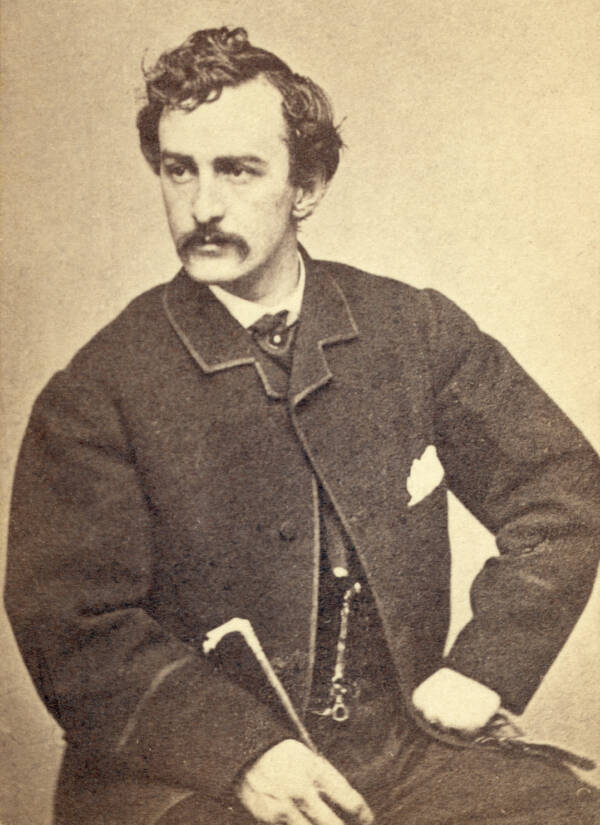
Library of CongressJohn Wilkes Booth in 1865, the year he killed President Abraham Lincoln.
Herold acquiesced. But Booth lingered. He didn’t leave the barn until one of the soldiers set it on fire. And as he emerged out of shadows and flame, a gun suddenly cracked through the silent night — and found its mark.
And although he briefly lingered between life and death, the bullet proved to be John Wilkes Booth’s cause of death.
To many, it was a satisfying end to the saga. But others believe that it wasn’t an ending at all and that Booth somehow managed to escape.
John Wilkes Booth’s Assassination Of Abraham Lincoln
Born on May 10, 1838, near Bel Air, Maryland, John Wilkes Booth spent most of his life known as an actor. He came from an acting family — both his father, Junius Brutus, and his brother, Edwin, found great acclaim as actors — and had a taste for stagecraft himself.
Like many Americans, however, he was transfixed with the mounting tensions across the country concerning slavery. Booth even joined a Richmond militia so that he could witness the execution of John Brown, the abolitionist who tried to incite a slave uprising in 1859.
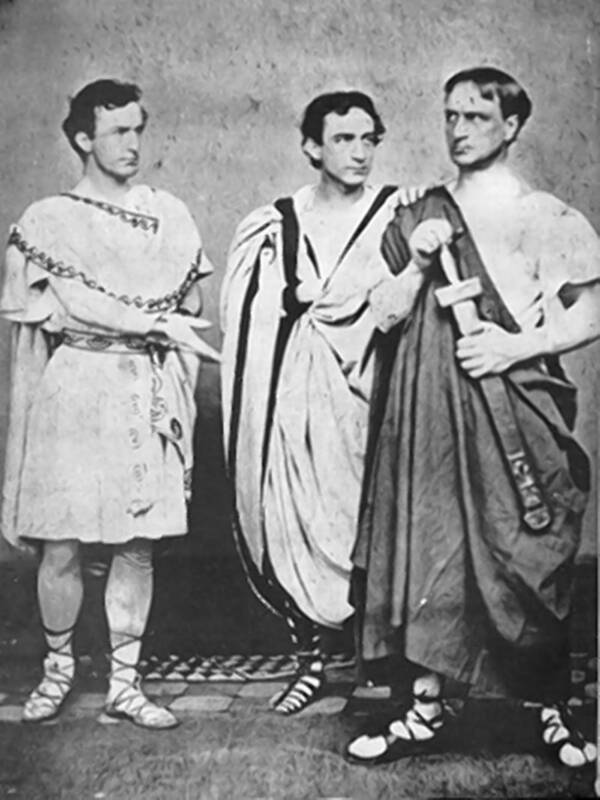
Public DomainJohn Wilkes Booth, left, with his actor brothers, Edwin and Junius Jr., in 1864.
When the Civil War broke out, Booth fell firmly on the side of the Confederacy. Though he never joined the Confederate Army — his mother begged him not to — he believed in its cause, and publicly denounced the Lincoln Administration on several occasions.
Indeed, much of Booth’s vitriol was saved for the president. Lincoln, he said, was “made the tool of the North to crush out, or try to crush out slavery” and fancied himself a “king.”
Lincoln’s “appearance, his pedigree, his low coarse jokes and anecdotes, his vulgar similes, his frivolity,” Booth wrote in December 1864, “are a disgrace to the seat he holds.”

Library of CongressAbraham Lincoln sitting for his last formal portrait on February 5, 1865, ten weeks before John Wilkes Booth killed him.
But nothing infuriated Booth more than when he saw Abraham Lincoln speak on April 11, 1865. Then, Booth was dismayed to hear the president suggest that he might extend voting rights for Black people.
“That means n****r citizenship,” Booth seethed. “Now, by God, I’ll put him through. That is the last speech he will ever make.”
He meant it. Booth launched a plan to not only kill Lincoln but topple the whole Union government. Just three days after the president’s speech, Booth sent assassins to kill William Seward, the secretary of state, and Andrew Johnson, the vice president. Abraham Lincoln, he decided, he would kill himself.
Though Booth’s co-conspirators failed in their tasks, John Wilkes Booth succeeded in his. As the president, his wife Mary, and a young couple named Henry Rathbone and Clara Harris watched a performance of My American Cousin in a box at Ford’s Theater, Booth crept up behind them.
He waited until the audience laughed — and then fired a shot into Lincoln’s head. After scuffling with Rathbone, John Wilkes Booth leaped down into the crowd crying: “Sic Semper Tyrannis!” meaning, “thus always to tyrants” and made his escape.
The actor-turned-assassin had infused the Lincoln assassination with drama. But the story of John Wilkes Booth’s death was yet to unfold.
The Hunt To Find John Wilkes Booth
In his triumphant leap, John Wilkes Booth had broken his leg. Nevertheless, he managed to evade the horrified crowd and climb onto his horse outside Ford’s Theater. The actor rode to the Navy Yard Bridge, where he convinced a guard to let him break curfew and leave the city.
From there, Booth met up with one of his co-conspirators, David Herold. They made their way to Surratt’s Tavern in present-day Clinton, Maryland, where they had asked another conspirator, Mary Surratt, to leave them guns, binoculars, and whiskey.
“[Booth] then asked me if I wanted to hear some news,” the bartender later testified. “He then said: ‘We have killed President Lincoln and Secretary Seward.'”
In fact, neither Seward nor Lincoln were dead — yet. But while Seward survived the injuries inflicted by his would-be assassin, Lincoln succumbed to Booth’s gunshot on the morning of April 15. By then, Booth and Herold had made it to the home of Dr. Samuel Mudd in Waldorf, Maryland.
Mudd — who may have met Booth a couple of times before — set his leg and let Booth and Herold sleep in his house. A few hours later, Booth and Herold took to the road again.
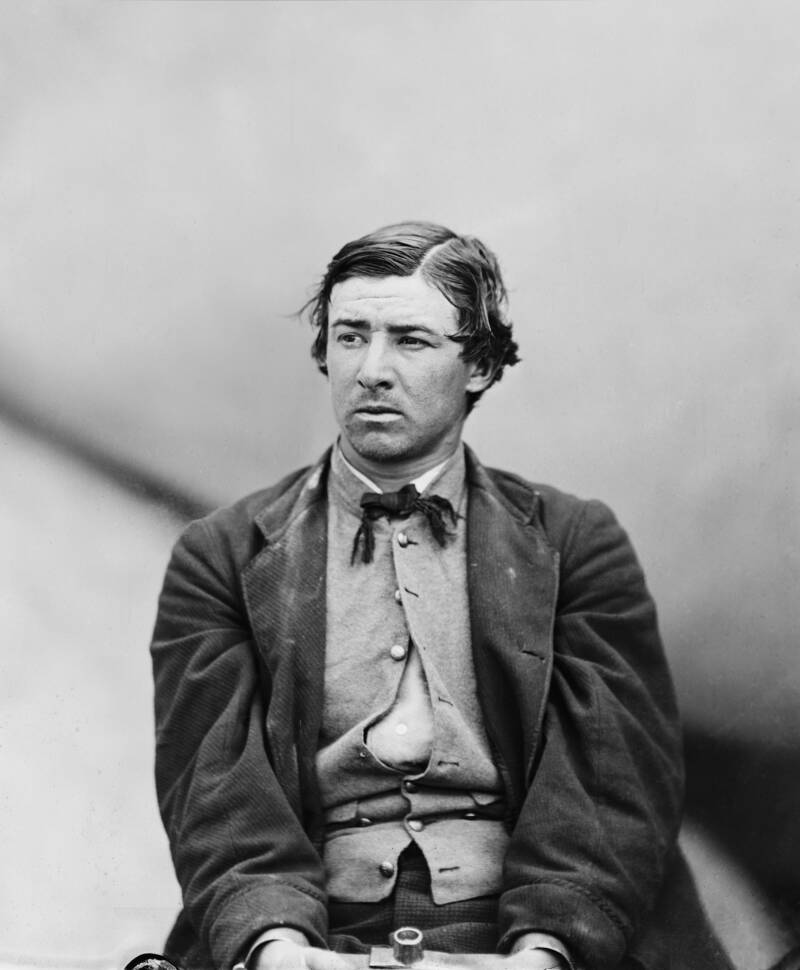
Public DomainDavid Herold after his arrest in 1865.
But though they were aided by Confederate sympathizers at almost every step of the way, Booth’s mood had darkened. He was in pain and had had to camp out in forests and swamps; federal troops were hot on his heels and he’d failed numerous times to cross the Potomac.
Worse of all, Booth had finally caught a glimpse of a newspaper, which hadn’t — as he expected — heralded him as a hero. Even some Southern newspapers expressed sympathy about the president’s murder.
“After being hunted like a dog through swamps, woods, and last night being chased by gunboats till I was forced to return, wet, cold and starving, with every man’s hand against me, I am here in despair,” Booth wrote in his diary on April 21.
“And why? For doing what Brutus was honored for — what made [William] Tell a hero. And yet I, for striking down a greater tyrant than they ever knew, am looked upon as a common cut-throat.”
Bitterly, he also wrote in his diary that: “I have too great a soul to die like a criminal” — an ironic statement, considering John Wilkes Boothe’s cause of death.
A few days later, on April 23, his spirits lifted when he and Herold finally made it across the river and into Virginia. But John Wilkes Booth had also taken one step closer to his doom.
How Did John Wilkes Booth Die?
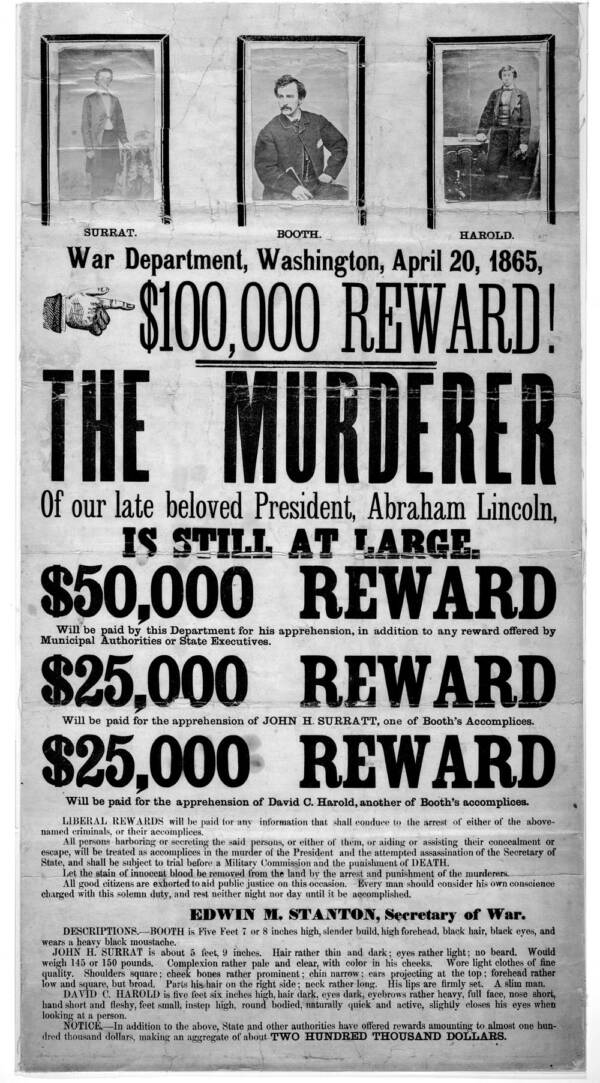
Public DomainThere was little doubt who had killed Lincoln, as John Wilkes Booth was a well-known actor.
On April 24, John Wilkes Booth and David Herold stumbled onto a farm near Port Royal, Virginia. They convinced the farm’s owner, Richard Garrett, that they were cousins, and he agreed to let them stay the night.
Though Garrett later claimed that he didn’t know anything about the Lincoln assassination, something about the two men disconcerted the farmer. He let them sleep in his house on the 24th, but not on the 25th. Then, Garrett demanded that Booth and Herold stay in his tobacco barn.
And as the fugitives dozed in the wee hours of the morning of April 26, Union soldiers crept up to the farmhouse. Booth awoke to the sound of dogs barking and the heart-stopping noise of soldiers on the march. To his horror, the assassin then found that the Garretts, fearing that Booth and Herold would rob them, had locked the barn door.
“We went right up to the barn door and tried to get out,” Herold later recalled, “but found it was locked.
“[W]e [then] went directly to the back end of the barn, and we tried to kick a board off so we could crawl out,” Herold remembered. But they were trapped.
Meanwhile, the men of the 16th New York Cavalry regiment — and two detectives — had begun to interrogate Richard Garrett. As the farmer stumbled over his answers, his son John confirmed that two men were hiding in the tobacco barn.
“Surrender, or we’ll fire the barn and smoke you out like rats!” shouted Lieutenant Luther Baker, one of the detectives. “We’ll give you five minutes more to make up your minds.”
Booth demanded the soldiers identify themselves. Baker refused.
“We want you,” he said, “and we know who you are. Give up your arms and come out!”
Still, Booth dithered. But Herold wanted to surrender. As Booth’s accomplice prepared to leave the barn, Booth made it clear that he meant to go down fighting. “When you go out, don’t tell them the arms I have,” he commanded.
To the soldiers, Booth added: “I have got but one leg. If you will withdraw your men in line 100 yards from the door, I will come out and fight you.”
A thrill ran through the soldiers — they knew that Lincoln’s assassin had hurt his leg. But Booth was wanted alive, so they decided to smoke him out instead. One of the detectives crept along the side of the barn and lit it on fire.
As smoke billowed from the barn, one of the soldiers, Boston Corbett, kept an eye on the assassin through slits in the walls.
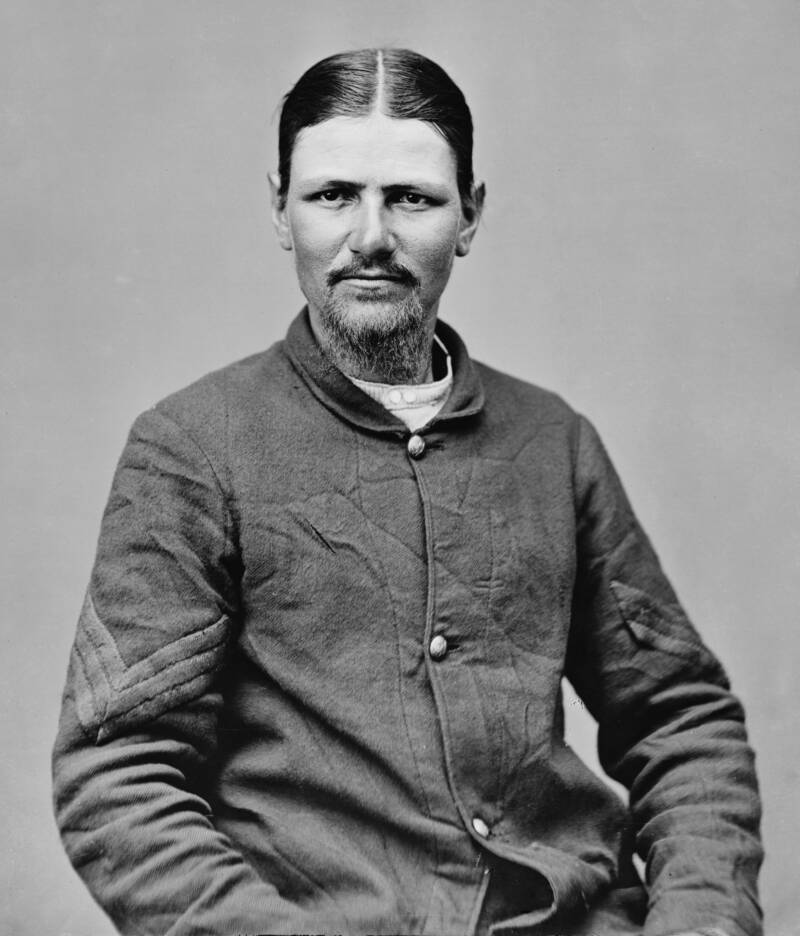
Library of CongressJohn Wilkes Booth died at the hands of Boston Corbett, a Union soldier.
“Finding the fire gaining upon him, [Booth] turned to the other side of the barn and got towards where the door was; and, as he got there, I saw him make a movement towards the floor. I supposed he was going to fight his way out,” Corbett recalled.
“One of the men who was watching told me that [Booth] aimed his carbine at him. He was taking aim with the carbine, but at whom I could not say. My mind was upon him attentively to see that he did no harm; and, when I became impressed that it was time, I shot him.”
Corbett later said that he hadn’t meant to kill Booth and, anyway, “God Almighty directed me to.”
Regardless, his shot had hit its mark. Struck in the neck, he fell to his knees — and that single bullet proved to be John Wilkes Booth’s cause of death. The soldiers dragged him outside, where Lincoln’s assassin croaked: “Tell mother, I die for my country.”
But John Wilkes Booth’s death didn’t come immediately. He clung to life in great agony as soldiers milled around him, ignoring his pleas to kill him.
Finally, almost five hours later, Booth lifted his hands and stared at them. “Useless, useless,” he said, and then went still.
John Wilkes Booth died at around 7:15 a.m. on April 26, 1865, 12 harrowing days after he’d shot Abraham Lincoln.
After John Wilkes Booth’s Death
Though John Wilkes Booth died on April 26, the nation was forced to grapple with his crimes in the months and years that followed. On July 7, 1865, his co-conspirators — David Herold, Mary E. Surratt, Lewis Powell, and George Atzerodt — were hanged.
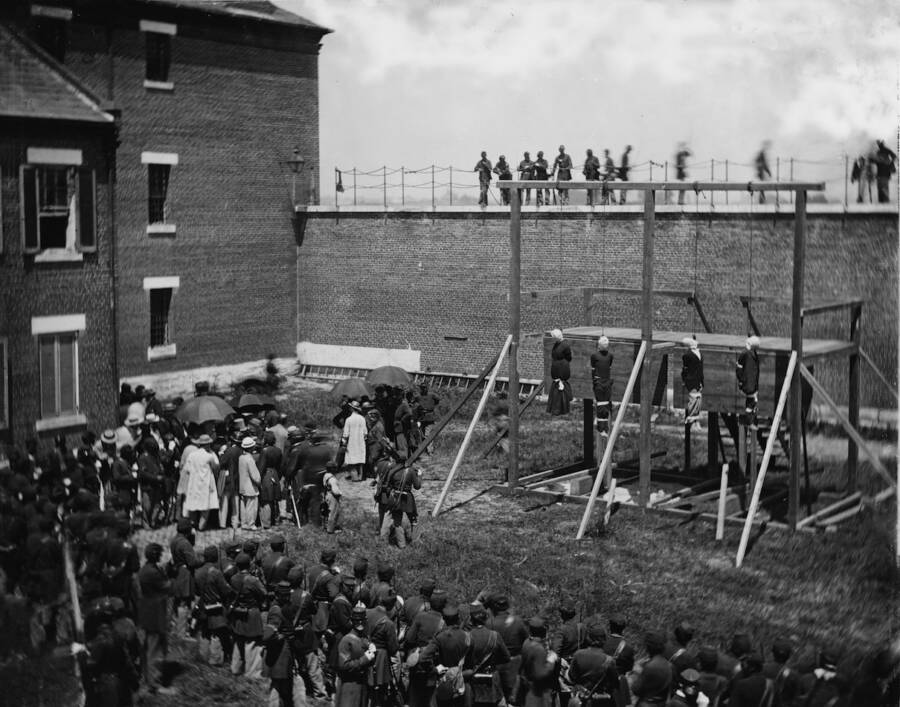
Library of CongressFour co-conspirators in Lincoln’s assassination were hanged together, three months after John Wilkes Booth’s death.
“The last act in the tragedy of the 19th century is ended,” wrote the Washington Evening Star. “The wretched criminals have been hurried into eternity, and tonight will be hidden in despised graves, loaded with the execrations of mankind.”
But the tragedy of the Lincoln assassination echoed on and on. His successor, Andrew Johnson, had none of Lincoln’s openness to expanding suffrage to Black Americans.
“This is a country for white men, and by God, as long as I am President, it shall be a government for white men,” Johnson wrote in 1866. He spent most of his presidency battling with Congress and only narrowly survived an impeachment attempt.
What’s more, some believe that John Wilkes Booth got away with killing Lincoln. An albeit weak conspiracy theory claims that someone else died in Richard Garrett’s farm and that Booth managed to escape. It states that he lived out his days as a man named John St. Helen or David Elihu George.
Even stranger, George’s mummy became a popular carnival attraction as the “THE MAN WHO MURDERED LINCOLN.” But the mummy wasn’t Booth — it lacked Booth’s famous injury and even the small tattoo he had on his wrist.
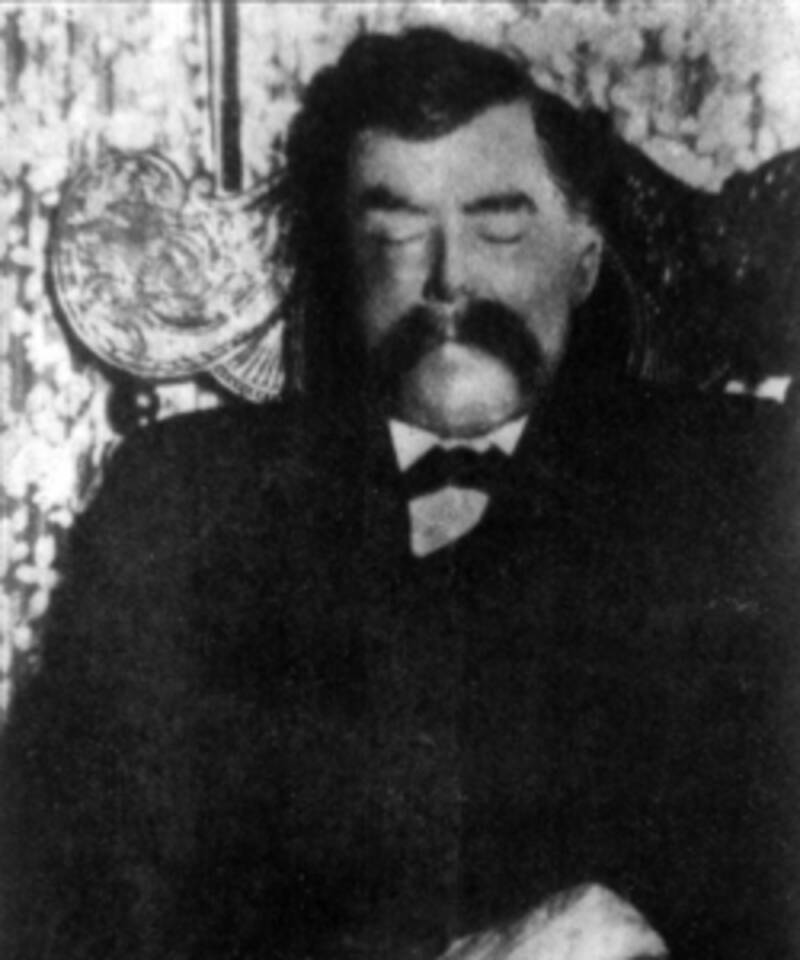
Public DomainDavid E. George shortly after his death in 1903.
In the end, it seems perfectly clear that John Wilkes Booth died on April 26, 1865. Not only that, but Booth died in great agony and surrounded by enemies. He never achieved the hero’s welcome he’d hoped for, nor the glory he felt certain would come.
He’s buried at his family plot in Green Mount Cemetery in Baltimore. There, people over the years have left pennies — coins which, of course, bear the likeness of Abraham Lincoln.
After reading about how John Wilkes Booth died, learn how his co-conspirator John Surratt escaped execution. Or, go inside the curious theory that Abraham Lincoln was Black.





